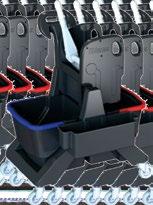
May/June 2024

In this issue:


May/June 2024

In this issue:
Tech and innovation redefine the industry
World Hand Hygiene Day
Hard floorcare solutions
Guide to success in FM sector
Africa’s leading dedicated hygiene, cleaning, pest control, textile care and facility management publication




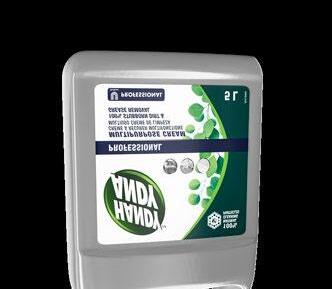


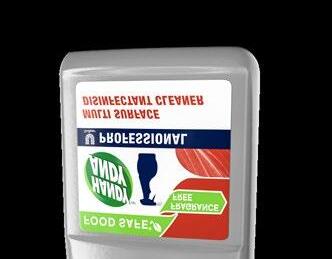







Cover story
WE THINK CLEAN – Unique in their value proposition and distinct from retail products, Unilever Professional products are engineered to meet specific business needs for the best results with minimal effort. With trusted brands used by millions of people worldwide, Unilever Professional means having peace of mind and results you can trust. We engineer products for a variety of businesses including: food service/ restaurants, hospitality, public washrooms and other establishments. Unilever Professional has been meeting the specific needs of households and businesses for years, providing the best results with minimal effort every time. Our brands are trusted by millions of people worldwide and for a good reason. No matter your business’ needs, Unilever Professional makes cleaning easy with brands you can trust to give you exceptional results. It’s the professional choice. Read more on page 18.
Soap for Hope project to make a difference in local communities • Enertec Batteries relocates to new Joburg branch
Power of hand hygiene emphasised as a disease control measure
• Charting the evolution of research into hand drying over 15-plus years • Karcher opens regional distribution centre in Kenya
World Hand Hygiene Day: 2024 Healthy Handwashing Habits Survey Insights
Bailing on bulk-fill benefits business and the planet
African Cleaning Review is aimed at end-users, contractors and suppliers of products and services to Africa’s Cleaning, Hygiene, Maintenance, Textile Care, Pest Control, Waste- and Facility Management Services industries. It is published every other month by: e-squared publications t/a e-squared Media
Tel: +27 (0) 11 238 7848 or +27 (0) 72 611 1959
PO Box 1976, Halfway House, 1685, South Africa
Email: africancleaningreview@cleantex.co.za
Website: www.africancleaningreview.co.za
@AfricanCleanMag AfricanCleaningReview african-cleaning-review
Publishing Editor: Johann van Vuuren +27 (0) 11 238 7848 or +27 (0) 72 611 1959
Email: africancleaningreview@cleantex.co.za
Advertising: +27 (0) 11 238 7848 or +27 (0) 72 611 1959
Email: africancleaningreview@cleantex.co.za
Operations and Accounts: Nandé Jacobs
Email: africancleaningreview@cleantex.co.za
All editorial contributions can be sent to the editor who reserves the right to publish editorial based on the strength of its content. No articles or photographs may be reproduced, in whole or in part, without written permission from the publishers. Although every effort is made to ensure the accuracy and reliability of material published in African Cleaning Review, e-squared Media and its agents can accept no responsibility for the veracity of the claims made by contributors, manufacturers or advertisers. Copyright of all material published in African Cleaning Review remains with e-squared Media and its agents.

Planned features for 2024
Feature sections in every issue:
• Textile care review
• Facilities management review
July/August issue: Editorial deadline 14 June
• Healthcare cleaning and hygiene
• Wipes and wiping solutions
• Cleantex Africa 2024 preview
September/October issue: Editorial deadline 16 August
• Sustainability in cleaning
• Washroom hygiene
• Cleantex Africa 2024 show catalogue
Secure your company’s presence at Cleantex Africa 2024, the only dedicated exhibition in Sub-Saharan Africa for professional cleaning, hygiene and all related workplace cleanliness industries. This international event boasts a 29-year history and is supported and endorsed by all major industry associations. Book a prime position stand! www.cleantex.co.za
publication and media partner of:



Promoting clean for a quarter century

This issue’s front cover image celebrates the anniversary of African Cleaning Review, launched 25 years ago with the foremost aim to serve the professional cleaning and hygiene industry across Africa as a niche publication. As the face of an industry that has become increasingly more relevant since the COVID-19 pandemic African Cleaning Review continues to play an invaluable role in portraying the significance of professional cleaning to a broad-based audience across multiple industry sectors. As the shop window of an essential industry, this bi-monthly magazine, complimented by the annual Buyer’s Guide, reflects the relevance and magnitude of creating healthy spaces.
While reminiscing, it is important to take cognisance of the future and how cleaning is portrayed in the minds of end users and facility managers, irrespective of the industry they represent. This is where African Cleaning Review’s mission is clear – to continue steadfastly by promoting the value of clean and thereby change the general perception of cleaning and hygiene in general.
As an integral part of this evolving campaign, African Cleaning Review recently visited Interclean Amsterdam, the world’s leading platform for cleaning professionals, to stay abreast of the advances in cleaning and to promote South Africa as an appropriate business platform and springboard to expand into other regions of the continent. Read more about the show on page 16.
At African Cleaning Review we look forward to maintaining our leading role in providing insight of the latest developments, news and trends and invite the cleaning community to join us in the next exciting phase of growth and connection.
Enjoy reading the cross-section of topical articles published in our 25th anniversary edition.

Advancements in technology are transforming the cleaning industry. From robotic vacuums to advanced disinfection systems, these innovations are not only boosting efficiency but also elevating health, safety, and environmental standards.
The introduction of robotic cleaning equipment has been a game changer in the cleaning industry. These robots are helping to drive efficiency, cost savings, and consistent, high-quality cleaning through autonomous operations. The technology is also enabling human workers to focus on more specialised tasks, to enable further overall efficiency improvements in the different cleaning functions.
According to recent research by Kaspersky, employees in the Middle East, Turkey, and Africa region (META) have shown a significant level of trust in robots for routine cleaning tasks. In South Africa, 86 percent of employees surveyed expressed confidence in robots’ ability to handle cleaning duties within the manufacturing sector.
Automation and smart devices are revolutionising cleaning tasks by saving time and effort and ensuring a more efficient cleaning process. In addition, sensors and data monitoring continue to improve cleaning quality and efficiency, while eco-friendly products continue to reduce the environmental
impact of cleaning activities.
Although South Africa has shown a relatively low uptake, it is increasingly being influenced by the global focus on sustainability, automation, and intelligent cleaning technologies to fast track the pace of adoption. The widespread adoption of robotics and automation worldwide is expected to drive South Africa’s exploration of these technologies for enhanced efficiency and productivity.
South Africa will likely integrate smart cleaning solutions based on IoT devices and sensors into its practices to align with global trends. Furthermore, the integration of artificial intelligence (AI) and machine learning could further enhance resource management and optimise cleaning schedules through predictive maintenance and data analytics.
In addition, the cleaning industry in South Africa stands to benefit from innovations in disinfection technologies, antimicrobial coatings, and global health and hygiene efforts. While regional differences may exist,
cleaning technology trends indicate a shift toward more sustainable, healthconscious, and intelligent cleaning practices in the country, aligning with global trends.
The implementation of cleaning innovations, particularly robotics, offers several advantages to various sectors facing unique challenges.
Warehouses, manufacturing plants, and logistics centres stand to benefit from the efficiency and speed of robotic cleaners, as these would allow them to cover large areas quickly.
In healthcare, robotic cleaners maintain strict hygiene standards, reducing the risk of infections. The healthcare sector can deploy these autonomous cleaners during off-peak hours without disturbing guests or patients to achieve greater levels of cleanliness and efficiency.
The retail sector also stands to benefit from robotic cleaners, to improve the shopping environment with regular maintenance in high-traffic areas.
In the commercial sector, there is a rise in the use of disinfection services and antimicrobial coatings to maintain cleanliness in critical areas. These solutions have become effective in eliminating harmful pathogens and are favoured for their long-lasting protection, especially in high-traffic places like healthcare facilities, gym facilities, shopping centres and offices.
Increased awareness of hygiene importance and global health challenges has driven the adoption of innovative cleaning techniques. Businesses and organisations around the world now recognise the necessity of proactive measures to ensure a safe and hygienic environment. While traditional cleaning products remain essential, the incorporation of disinfection services and innovative cleaning solutions is a strategic response to evolving health standards, making them preferred choices in various industries.
Integrating automation and robotics into operations to enhance cleaning

precision and efficiency is likely to drive greater efficiencies for businesses both now and in the future. The focus will continue to be on smarter, more efficient, and environmentally conscious cleaning practices to improve the quality of cleaning services and contribute to the well-being of occupants and the planet.
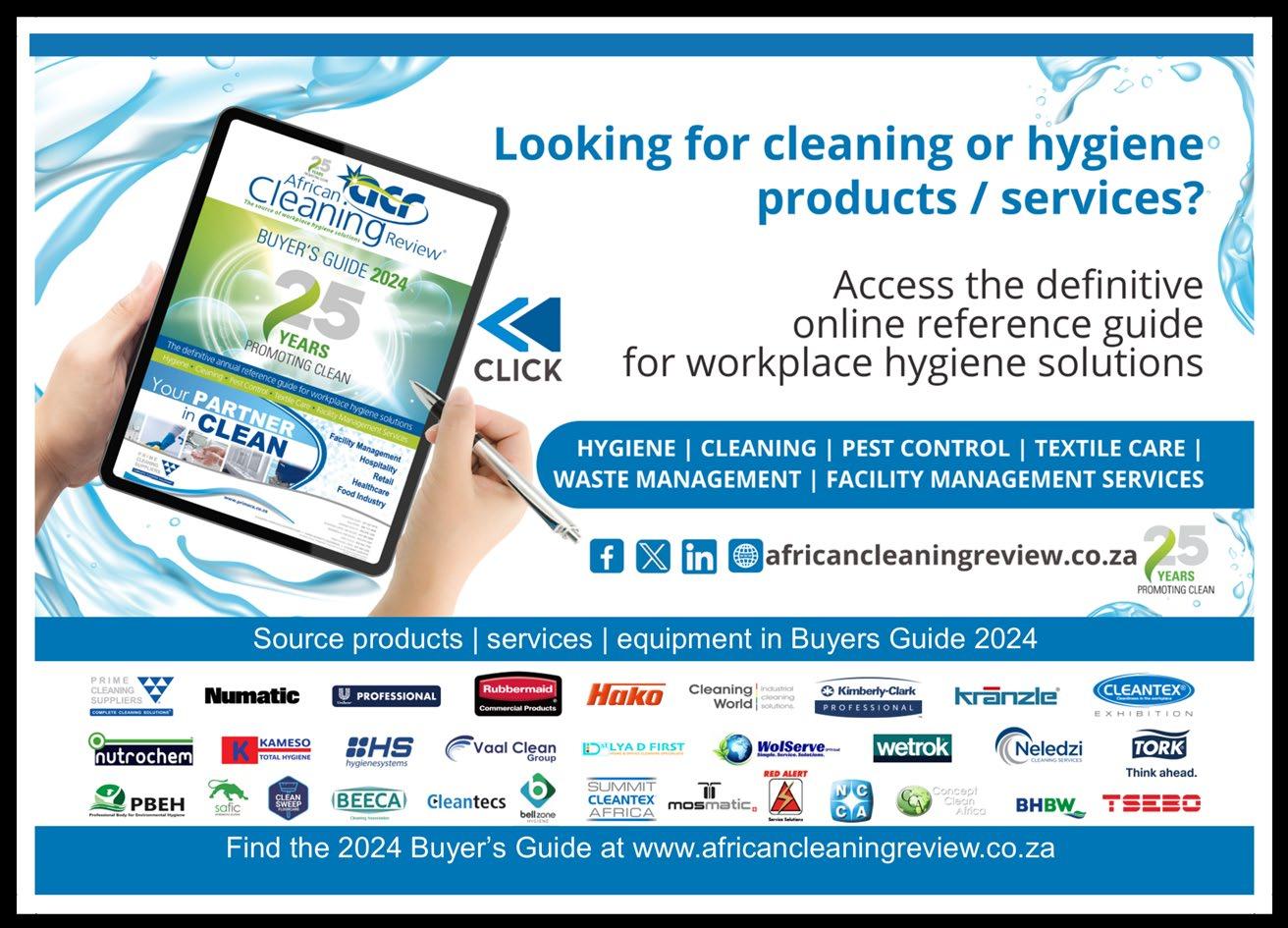
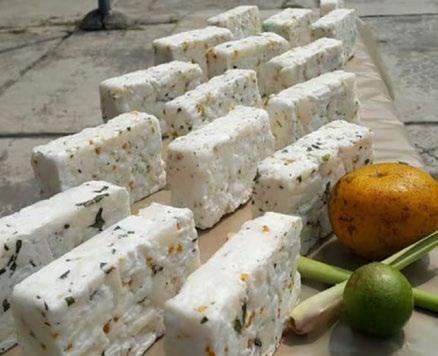
Through its extensive network of local farm operations, South African NGO the Pebbles Project launched the Soap for Hope programme in Cape Town setting the following goals:
• To divert 10,000 kg of soap bar waste annually away from landfills and incineration towards recycling.
iversey and the Pebbles Project launched the Soap for Hope programme in Cape Town in March. South Africa is one of more than 50 countries globally benefitting from the programme initiated by Diversey in 2013. Through the recycling of discarded hotel guest soap, this programme not only supports local communities by offering livelihood opportunities but also contributes to mitigating infant mortality rates associated with insufficient access to proper sanitation conditions.
The Cape Town initiative was one of the seven awarded by Dow via its annual Business Impact Fund, which brings together NGOs, non-profit organisations and Dow customers to help solve global issues using Dow technology and employees’ expertise.
• To distribute recycled soap bars to communities requiring hygiene resources and providing training on sanitation best practices.
• To train and empower young adults to manage the recycling operation as a small business.
“As a materials science company and supplier of raw materials that serve the cleaning market, Dow is proud to be a key collaborator of Soap for Hope that enables sustainable cleaning solutions whilst helping the local communities,” said Kevin Pillay, Dow’s country leader –Southern Africa.
“Soap for Hope is a programme that directly engages the local people in helping their own community. At the same time, it helps our hotel customers divert tons of solid soap waste [from] the local landfill. This will contribute to a cleaner and healthier environment in South Africa and create shared value
Enertec Batteries’ Johannesburg branch has relocated to a new, upgraded facility within the Cargo Compass building at Jet Park, Johannesburg. This strategic move, which was completed at the end of March, represents a significant step forward in the company’s ongoing commitment to enhance its operations and service delivery.
Group Managing Director of Enertec Batteries, Greg de Ricquebourg, explained that the relocation was driven by a strategic shift to optimise its logistical processes and streamline its inventory management.
“The new move is perfectly in line with our commitment to providing high-quality products and exceptional service to our customers. With cuttingedge technology and streamlined processes, we can ensure faster turnaround times and more efficient order fulfilment, resulting in a better customer experience,” he added.
With access to a larger, more modern facility, the company is better positioned to leverage cutting-edge technology and implement industry best practices in battery manufacturing and distribution.
“We see this move as a strategic
for everyone involved – our company, our customers, and our communities,” added Mariette Van Vuuren, Sales Director, Diversey South Africa.
“The recycled soap will be made available to communities that do not have access to proper hygiene tools today,” said Sophie Warner, founder and CEO, Pebbles Project. “We will train unemployed young adults and women on entrepreneurship to upskill and empower them to run the recycling project as a small business.”
Richard Bray, group operations manager at Premier Hotels and Resorts said that the Group is proud to partner with Dow, Diversey and The Pebbles Project for the Soap for Hope initiative, adding, “recycling and green initiatives along with building the communities in which we operate is extremely important to us. We are proud to join the Soap for Hope Project and look forward to helping this initiative take flight in making a difference in the local community.”
For more information visit: www.pebblesproject.org, www.diversey.com/en/diversey and www.dow.com
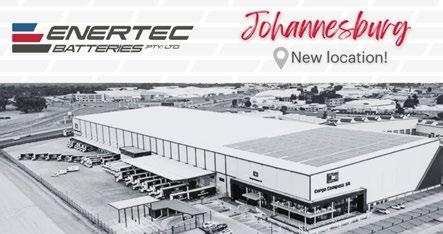
investment in our future. By improving our operational capabilities and expanding our footprint, we will be better positioned to meet market demands and drive long-term success,” concluded de Ricquebourg.
For more information visit: www.enertec.co.za
The Gauteng Department of Health (GDoH) joined the global community in observing World Hand Hygiene Day (WHHD) to raise awareness about the importance of hand hygiene in preventing the spread of diseases. World Hand Hygiene Day (WHHD) is observed annually on 5 May to improve hand hygiene standards at home and the workplace thereby protecting health and care workers and communities from infections and curbing the spread of harmful germs. The 2024 WHHD theme is “Promoting knowledge and capacity building of health and care workers through innovative and impactful training and education, on infection prevention and control, including hand hygiene”.
“It is critical that the health and care workers and the public at large make hand hygiene a non-negotiable routine in their daily lives as a simple, yet powerful tool to safeguard their
wellbeing. Through advocacy and education, we can foster these good habits that help prevent the spread of diseases,” emphasises Gauteng MEC for Health and Wellness, Nomantu Nkomo-Ralehoko.
Hand hygiene was proven effective as a preventive measure during the COVID-19 pandemic and the recent Cholera outbreak. It is important to remember that when practised properly, hand hygiene can help to prevent the spread of viruses including respiratory and diarrheal infections at home and in public settings. Hands should be washed with a soap or alcohol-based sanitiser for at least 20 seconds, covering all surfaces of the hands including the palms, back of the hands, between the fingers, back of the fingers, thumbs, fingertips and wrists.
“As we enter the winter months which often sees an increase in cases of flu infections, the message around
hand hygiene is even more urgent as a proactive measure to protect ourselves and loved ones to stop the spread of respiratory infections such as influenza,” says Nkomo-Ralehoko.





The European Tissue Symposium (ETS) is mounting a campaign to highlight the evolution of scientific research into hand drying of more than 15 years. Hand Drying Discovery Roadmap – A 15-Year Story, charts the numerous pieces of research undertaken into the merits of different hand drying methods and their implications for hygiene and cleanliness in the washroom and beyond. The body of knowledge has been constantly reinforced over the past 15+ years – the research roadmap starts in 2008 with a
study performed by the University of Westminster. The research has explored the various levels of bacteria on the hands associated with different hand drying methods, through to the latest research assessing the potential for viral contamination of users and the environment via aerosols generated during hand drying.
Numerous studies have been carried out by researchers and academics from respected universities and hospitals. They explore the link between hand drying methods and broader hygiene and make essential reading for all those responsible for upholding washroom hygiene and protecting the public – from procurement managers in hospitals and public buildings to landlords, restaurateurs, and hoteliers. The campaign centres around a timeline created by Professor Mark Wilcox OBE
Kärcher recently announced an approximate Euro 3 million investment in the Kenyan market with the aim to develop the business into a full subsidiary, which includes a regional distribution centre at Freight Forwarders Solutions (FFS) in Tatu City, the 5,000acre mixed-use Special Economic Zone (SEZ) on Nairobi’s doorstep, positioning Kenya as a hub for East Africa.
“Our goal is to transform the cleaning landscape in Kenya by bringing advanced products and services to our customers,” says Christian May, Deputy Chief Executive Officer and Chief Sales officer at Kärcher. “By establishing Kenya as our regional hub, we are reducing lead times and enhancing responsiveness, ensuring prompt service and satisfaction for our clients.”
Stephen Jennings, Founder and CEO of Rendeavour, the owner and developer of Tatu City, adds, “Kärcher joins the ranks of many leading global brands at Tatu City SEZ. As Kenya’s first mixedused SEZ, Tatu City has already attracted
USD 2.5 billion in investment from more than 78 businesses, from healthcare and food and beverage production to call centres, software engineering, and now cleaning solutions. These investments are creating thousands of much-needed jobs for Kenyans.”
Sebastian Groth, Ambassador of the Republic of Germany to Kenya, says, “Kärcher‘s investment in Kenya highlights the strong economic ties between Germany and Kenya. As a global leader in cleaning technology, Kärcher exemplifies German engineering excellence and innovation. We look forward to further collaboration and mutual growth between our two nations.”
Kärcher has established a presence in seven Carrefour outlets and partnered with various distributors to cater to different customer segments. Its flagship store, located in Upper Hill, Nairobi, serves as a brand store and service centre operated by Equipment and Logistics, which was recently
of the Leeds Teaching Hospitals and the University of Leeds, who has led several of the studies, and shows how scientific understanding and evidence have accumulated over the years.
The Hand Drying Discovery Roadmap – A 15-Year Story campaign illustrates how our understanding of the importance of hand drying as a part of the hand hygiene process has evolved, as new studies explore different angles. It underlines the importance of applying sound science in providing clear evidence to support public health and determine the most hygienic way to dry hands and minimise the spread of infection.
The roadmap showcases how studies have probed different facets of hand drying and the impact on hygiene and cleanliness – for more information click: www.europeantissue.com/ discovery-roadmap

Richard
Managing Director Kenya & General Manager, East Africa, Kärcher; Christian May, Deputy Chief Executive Officer & Chief Sales Officer, Kärcher; Sebastian Groth, Ambassador of the Federal Republic of Germany to Kenya; and Joseph Nguyo, Senior Deputy Secretary, State Department for Investment Promotion.
presented with a 20-year partnership award. Business benefits at Tatu City SEZ include VAT zero-rating, import and stamp duty exemptions and 10 percent corporate tax for the first 10 years and 15 percent for 10 years thereafter. Tatu City is a 5,000-acre new city on Nairobi’s doorstep with homes, schools, businesses, a shopping district, medical clinic, nature areas and recreation for more than 250,000 residents and tens of thousands of day visitors.

Makeagreatimpressiononyourcustomers
Cleansmarter,notharder
Protectyourfloor’sshine
Savemoneyandtime




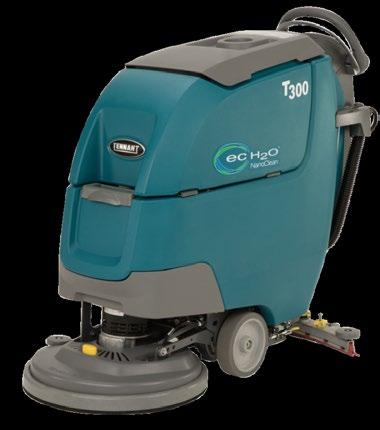

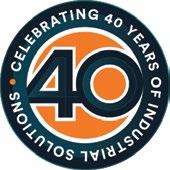
For over a decade, Bradley Company’s annual Healthy Handwashing Survey has illuminated America’s handwashing behaviours and public washroom preferences. In January 2024, Bradley Company surveyed 1,003 American adults, revealing intriguing insights into hand hygiene practices and washroom expectations.
“Our goal for this research during the past 15 years has been to keep the health benefits of handwashing with soap top-of-mind and encourage handwashing follow-through,” said Jon Dommisse, Vice President of Business Development and Strategy for Bradley. “In public settings where germs can be of concern, people depend on clean, well-stocked washrooms for executing handwashing. Similar to how the iPod changed music and 9/11 changed air travel, COVID-19 has forever changed public washroom expectations and design for handwashing.”
The survey highlighted that Americans approach handwashing pragmatically, increasing frequency during seasonal virus outbreaks and illness. Notably, 77 percent prioritise hand hygiene during travel, while 89 percent cleanse after using public washrooms. Surprisingly, 29 percent of men skip handwashing post-washroom use.
Parents play a pivotal role in instilling handwashing habits in children. Most parents encourage handwashing (63%), use fun soaps (39%), or incorporate handwashing into routines (30%).
The survey’s results also show the respondents’ thoughts on public washrooms. Public washroom assessments unveiled a desire for enhanced privacy, with 70 percent feeling stalls lack adequate coverage. Respondents display distinct preferences, selecting stalls furthest from entrances (40%) and favouring full-length doors (45%). Respondents expressed frustration over washroom pet gripes, including paper towel litter (62%) and unkempt appearances (41%). Despite some improvements, 43 percent report

unpleasant experiences, emphasising the need for cleaner, well-stocked facilities with touchless fixtures.
As we commemorate World Hand Hygiene Day every year on 5 May, these findings serve as a stark reminder of the importance of hand hygiene. They underscore its crucial role in preventing
illness and enhancing public health. Let’s all commit to making hand hygiene a top priority.
Bradley is known as the leader in advanced commercial washrooms and comprehensive emergency safety solutions that make public environments hygienic and safe.

Businesses across the world are facing increasing pressure to improve the sustainability of their operations, but with budgets to balance and higher cleaning and hygiene expectations from staff and customers to handle, implementing the right soap and sanitiser dispensers can be a valuable step forward. What’s more, the commercial implications and risks of an ineffective and wasteful hand hygiene strategy could be catastrophic for both your reputation and finances.
In this article, the experts at Rubbermaid Commercial Products (RCP) take a closer look at investing in dispensers that are not only durable but also use hygienically sealed refills that can help businesses cut costs, save time, and reduce waste. They also explain how upgrading washroom soap dispensers at Durban University of Technology (DUT) saw them achieve significant cost savings, reduced wastage, improved efficiency, and better cost in use.
You might assume that all hand hygiene is created equal and that opting for bulk refills is the answer to protecting your bottom line. But with more applications per refill resulting in better cost in use, choosing soap and sanitiser dispensers that use concentrated dosing rather than bulk refills also mean less product, and
money, poured down the drain. Simply by opting for dispensers that provided more concentrated dosing through hygienically sealed refills, DUT reported cost savings of 40 percent, while still providing students and staff with quality hand hygiene. The team also found that with less people-handling required, they were able to improve efficiency. Additionally, moving away from bulkfill solutions also allowed them more control over wastage and resulted in better cost in use.
Not only is choosing hygienically sealed refills for your dispensers better for your bottom line, but they also have the advantage of keeping soap and sanitisers fresh and free from cross-contamination, unlike their bulk counterparts. One in four bulk-fill units has been shown to be contaminated with illness-causing bacteria.1 The implications of using contaminated
Sources 1. Preferred to manual pump dispensers, based on 415 RCP Facebook survey responses
dispensers for your facility’s reputation and the productivity of your staff should not be overlooked.
When upgrading hand hygiene solutions, it may be tempting to opt for cheaper dispensers, but flimsy dispensers that don’t stand the test of time only stretch your budget, test your patience, and increase wastage. Choosing products designed to last longer and that can withstand frequent use over long periods of time, can reduce and control your costs and minimise unnecessary waste.
RCP’s hand hygiene range is available in multiple styles and capacities to provide an essential visible and robust solution, fit to tackle today’s hygiene challenges. To speak with one of RCP’s experts about how you can upgrade your hand hygiene solutions register your details here.


According to studies, some healthcare providers only practice proper hand hygiene less than half of the recommended time. But research from Tork manufacturer Essity reveals that around 80 per cent of professionals have expressed a desire to improve their hand hygiene at work. Essity supported this year’s World Hand Hygiene Day with a series of interactive and immersive hand hygiene exercises. These are designed to help healthcare professionals effectively implement hygiene practices and improve adherence to the WHO’s 5 Moments of Hand Hygiene.
“Healthcare professionals are exposed to pathogens frequently throughout the day – whether through close contact with patients or interaction with high touch surfaces such as doorknobs, bedrails, or patient washrooms,” said Essity’s Sales Manager, Professional Hygiene, Liam Mynes.
“While the importance of hand hygiene is widely understood among healthcare providers, following hand hygiene best practices can be challenging. There is a growing need to empower effective implementation of sustainable, accessible, and scalable hygiene procedures.” Tork Virtual Reality (VR) Clean Hands Training and Education is designed to make hand hygiene training more engaging and effective to drive behavioural change and accelerate deeper learning. The training invites users into a digital world where they are confronted with a series of scenarios in which hand hygiene needs to be carried out. Trainees take on the role of a nurse, caregiver, or doctor where
they are tasked with caring for several patients. The trainee’s results are then assessed on how far they comply with the World Health Organisation’s 5 Moments of Hand Hygiene.
consistent, hands-on training that easily transfers to their day-to-day workflows,” said Dr Claire Kilpatrick, Director of KS Healthcare Consulting.
“Sharing hand hygiene knowledge
When the 65 million healthcare workers around the globe train and act on hand hygiene they help save lives – yours, a loved one’s, and those most vulnerable in society.
“According to research, we only remember 10 percent of what we read, 20 percent of what we hear and 30 percent of what we see,” said Liam. “However, when simulating an action as one does as a part of VR, we remember as much as 90 percent.” This is the ninth consecutive year that Tork participated in World Hand Hygiene Day, an initiative run by the Private Organisations for Patient Safety and facilitated by the World Health Organization. “To improve hand hygiene practices, it’s important for employees to have access to
is important because hand hygiene is one of the most effective ways to keep people safe from infection, help people understand when and how to perform hand hygiene, and achieve public health targets in a cost-effective way. When the 65 million healthcare workers around the globe train and act on hand hygiene they help save lives –yours, a loved one’s, and those most vulnerable in society.”
For more information visit: www.tork.co.uk/WorldHandHygieneDay
The way we view hand hygiene in a post-pandemic era has forever changed. In the ever-evolving landscape of retail stores, corporate offices, and other commercial spaces, maintaining a clean environment is no longer a luxury, but a necessity. This is where quality hand cleaning products have become the cornerstone of a healthy and productive space according to Prime Cleaning Suppliers’ Matthew Gervais.

Beyond COVID-19: The persistent germ threat
While the past pandemic heightened our awareness, germs and bacteria are not new threats. Our hands constantly interact with a multitude of surfaces throughout the day – lift buttons, keyboards, shopping trolleys – each one a potential breeding ground for harmful organisms. These include:
• Bacteria: E. coli, Salmonella, Staphylococcus aureus (Staph)
– These can cause a range of illnesses, from gastrointestinal distress and skin infections to more severe conditions.
• Viruses: The common cold, influenza, and the ever-present threat of new viral strains – all readily transmitted through hand-to-mouth contact.
The consequences of neglecting hand hygiene are evident. Increased absenteeism due to illness can disrupt operations and impact a company’s bottom line. Uncontrolled illnesses in customer areas can damage brand image and lead to lost sales.
Selecting the correct hand-cleaning products for commercial settings is crucial.
continues on page 12 >>



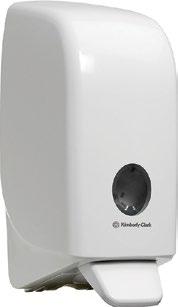

By partnering with a reputable supplier and incorporating their quality hand hygiene products into your routine, commercial businesses can create a healthier and more productive environment for all.

by Jason
• Efficacy: Select products with formulations proven to kill a broad spectrum of bacteria and viruses. Look for options that meet industry standards set by organisations like the National Regulator for Compulsory Specifications (NRCS).
• Skin sensitivity: Frequent handwashing can take a toll on the skin. Rather choose soaps and sanitiser products that are gentle and moisturising to prevent skin dryness and irritation.
• Accessibility: Make hand hygiene convenient by strategically placing dispensers with high-quality products at entry and exit points, washrooms, break rooms, and near shared equipment. Consider both hand soap and alcohol-based sanitisers to cater to different needs.
Partnering for a healthy workplace
The decision in maintaining a healthy workplace should not simply be about exploring products, equally important
is partnering with a reliable supplier that understands the unique needs of commercial operations. Gervais points out what to look for.
• Quality Assurance: Seek a supplier with a proven track record of providing high-quality, consistent products. Look for certifications that verify the manufacturing processes and adherence to industry standards.
• Product diversity: A good supplier will offer a variety of hand hygiene solutions to meet your specific needs. This might include bulk soap refills for dispenser systems, individual hand sanitisers for desks, and even wipes for the quick cleaning of surfaces.
• Responsiveness and Reliability: Choose a supplier with excellent customer service and a reliable supply chain. They should be able to promptly address your needs and ensure consistent product availability.
Investing in a healthier future
Prioritising quality hand hygiene products delivers a wealth of benefits:
• Reduced absenteeism: A healthy workforce means fewer sick days and increased productivity.
• Enhanced customer satisfaction: A clean environment fosters a sense of safety and well-being for patrons.
• Building brand trust: Demonstrating a commitment to hygiene portrays a professional and responsible business image. By partnering with a reputable supplier and incorporating their quality hand hygiene products into your routine, commercial businesses can create a healthier and more productive environment for all. Remember, in a post-pandemic world, hand hygiene is not just a practice but a powerful tool for safeguarding your business’ success.

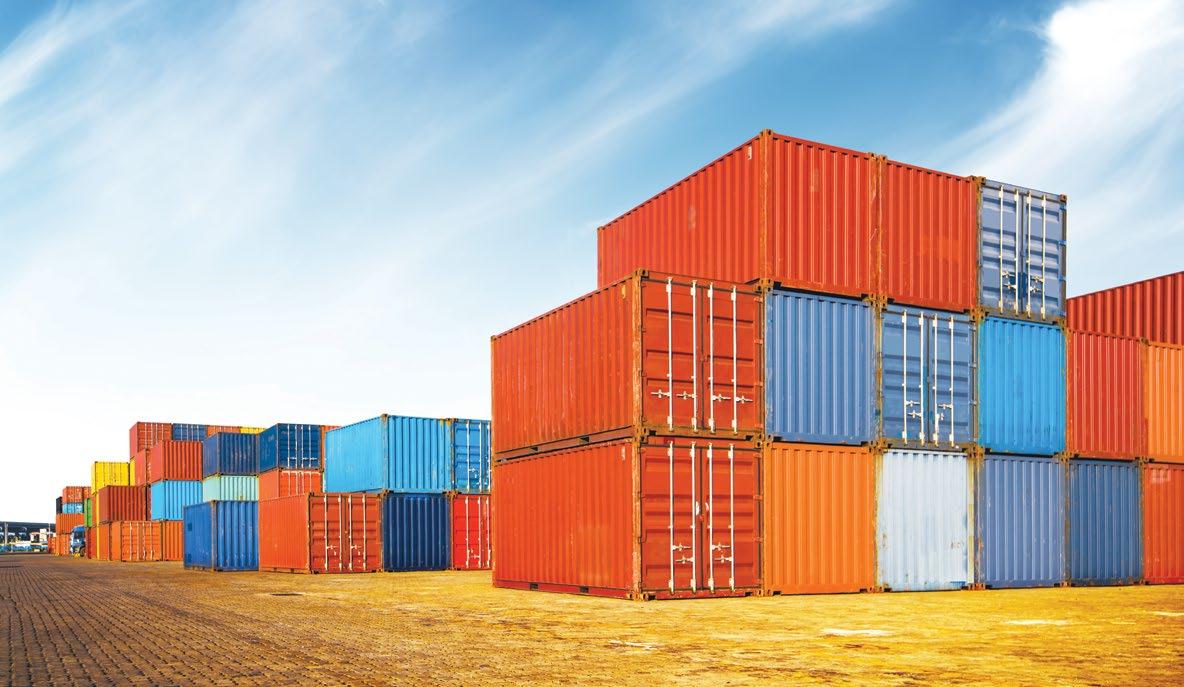
Worldwide, the distribution industry is a vital link between manufacturers, retailers, and consumers. It is a cornerstone of the global economy and a sector witnessing robust growth. In the US, for example, the Business Research Group estimates its value at nearly $49 billion, a figure projected to surpass $61 billion by 2027.
However, solid growth is only one trend in the industry, there are five more:
1. Customer insights
Customers will have more demanding expectations from the distribution industry in the future. To meet this challenge, exceptional distributors are using tools like data analytics. This is the science of analysing large volumes of data to improve business performance, efficiency, profit and decision-making.
2. The mobile revolution

It’s time to make way for a totally mobile world. These gadgets are not just for personal use anymore. They are becoming powerful tools for distributors, enabling them to manage inventory, track shipments, provide real-time delivery updates to customers and communicate more effectively with end customers.
3. The rise of e-commerce
The way business buyers shop is changing. They want the convenience and speed of online shopping, just like they experience on B2C platforms. In 2021, B2B e-commerce marketplaces sold a staggering $1.63 trillion worth of goods and services, a 17.8 percent increase from the previous year. This trend is set to continue, albeit at a slower pace, through to 2027.
4. Personalisation through CRM
Exceptional distributors will increasingly use Customer Relationship Management systems (CRM) to provide personalised services for their customers in the coming years. This technology “improves business relationships, helps grow your business, stores customer and prospect contact information, identifies sales opportunities, and manages marketing campaigns, all in one central location,”
according to Salesforce, (www.salesforce.com).
5. Artificial Intelligence
AI will help the distribution industry analyse substantial amounts of data and generate insights such as:
• Predicting product demand from specific industries and individual customers
• Providing tailored recommendations for customers
• Factoring in seasonality, historical sales data and market trends
“Exceptional distributors should see these trends as opportunities,” adds Michael Wilson, CEO and president of Afflink, (www.afflink.com) a leading distributor membership organisation.
“Distributors who take advantage of emerging trends and technologies are most likely to build deeper, longer lasting, and more lucrative relationships with their customers.”


South Africa’s growing population and economy lead to increased waste generation, and with diverting waste from landfills and improving recycling rates as key imperatives for the country’s National Waste Management Strategy (2020), it is essential that businesses play their part in achieving these goals. What’s more, implementing a waste management system that facilitates separation at source can have significant benefits for your business.
Rubbermaid Commercial Products (RCP) Sales Manager, Kementhrie Naidoo, offers her advice for facilities looking to reduce waste, cut costs and get their waste management future-fit to meet legal requirements and make significant sustainability strides.
For the vast majority (95%) of decisionmakers, improving the sustainability of
their operations remains crucial but with budget constraints to consider, investing in the right practices that will drive real results is a must.
Installing an efficient, multi-stream recycling system will help increase recycling sorting efficiency and reduce the volume of waste your facility sends to general disposal, saving associated costs and taxes. Legislation laid out in the National Environmental Management Waste Act (NEMWA) calls for waste to be separated at point of generation and with penalties ranging from hefty fines to licence revocations and even imprisonment, understanding your legal obligations when it comes to handling waste and recycling is essential. Ensure compliance with recycling laws while cutting waste collection costs by upgrading your recycling systems to capture more waste streams.
An efficient multi-stream recycling system can help your business meet its obligations while cost saving and improving sustainability. But how can you identify how and where to make these high-impact improvements?
With ambitions of becoming “the greenest delivery service on the planet”, RCP helped DPD, one of Europe’s leading parcel groups, to improve the waste and recycling at their depots resulting in both cost savings and sustainability improvements.
After identifying indicative savings by using the free online audit tool, RCP’s team of experts then undertook a series of ‘waste walks’ across the sites to ascertain the current state of play and identify opportunities for improvement. Effective and spaceefficient recycling systems – RCP’s Slim Jim® Recycling Stations –were rolled out as part of a staged installation process.

The results? Within the first year, DPD had boosted its recycling rate by 48 percent at six key sites. On completion of the roll-out across all DPD sites, the multi-stream recycling system will have contributed to over 6,500 tons of waste every year being diverted to the circular economy rather than going to general waste disposal. They also reported achieving a recycling rate of over 90 percent, cost savings of 27 percent and they recouped their investment within 12 months.
What does better recycling look like?
Implementing a multi-stream system will help you increase recycling rates and improve efficiency, but what should you be looking out for when choosing your recycling stations?
Modularity maximises results
Invest in modular systems over traditional ‘all-in-one’ systems as they allow for a tailored approach to waste management in different areas of your facility. This means you can add, and even take away, streams as required. What’s more, they’re typically easier to maintain and clean.
Visibility adds value
Make recycling simple by making it visible. Minimise the risk of cross-contamination and maximise recycling rates with clear and colour-coded signage that encourages straightforward separation at source

across all your containers, embedding a culture of recycling compliance across the business.
Get a handle on hygiene
Hygiene regulations, from the Department of Health, demand that refuse containers on food premises be easy-to-clean with close-fitting lids. For commercial kitchens and food outlets where hygiene is paramount, bins with lids like the Slim Jim® Step On will see you meet regulations, reduce the risk of contamination and keep odours to a minimum.
Durability drive success
For businesses who want solutions to stand up to the toughest environments, durable waste containers are essential. Reduce the need for frequent replacements by buying better and
wasting less, helping you support sustainability targets as well as cutting costs. Look out for long warranties for added peace of mind.
Get in touch for more expert advice and information about how partnering with RCP can help your business meet your users’ expectations at: rubbermaidsa.co.za

Since its appointment as the Southern African Hako dealer two years ago, BHBW has transformed the support provided to local Hako customers with services and solutions that deliver maximum equipment uptime, boost cleaning performance, and reduce maintenance costs. Through a 24/7 call centre, BHBW provides round-the-clock technical support, with an average countrywide response time of only four hours.
Hako customers have benefitted from BHBW’s investment in servicing lift truck customers countrywide. “As the exclusive Hyster dealer in Southern Africa for more than 90 years, BHBW has the expertise and infrastructure to meet and exceed Hako customers’ aftermarket requirements. Hyster technicians have been trained to service Hako equipment, supported by specialist technicians,” says Wouter Niemann, National Sales Manager for Hako equipment at BHBW. Should a Hako machine on a maintenance contract not be repaired within




For more information or a demonstration, please contact Hako National Sales Manager Wouter Niemann on 065 650 3839 or email WNiemann@bhbw.co.za
48 hours, BHBW provides a loan unit to return the customer to full productivity. An extensive stockholding of long-life OEM parts adds further value, says Niemann. “In the unlikely event that a Hako part is not available off-the-shelf, it is freighted from Germany by air rather than shipped, as is often the case.”
Maintenance plans are tailored to customer needs and vary from routine to full maintenance contracts, the latter often including consumables and brushes.
“Whether your Hako equipment operates 24 hours per day or intermittently, whether it’s a fleet operating at one of South Africa’s largest DCs or a single unit, we are committed to delivering aftermarket support that will ensure maximum peace of mind.”
For more information, contact Wouter Niemann at BHBW on 065 650 3839 or email WNiemann@bhbw.co.za













































Europe’s leading international exhibition for the professional cleaning sector, Interclean Amsterdam, opened its doors this year as a completely sold-out event for the first time since its inception, according to the organisers. Interclean Amsterdam officially opened on 14 May 2024, with the announcement of the Overall Winner of the Amsterdam Innovation Award. This prestigious Award was presented to Diversey – A Solenis Company, for its LESSEAU® NO-Touch bar soap dispenser and refills for a product that the jury believed can have a very broad and truly meaningful impact in so many different applications.
Chair of the Jury, Michelle Marshall said, “All of us on the jury were very impressed with how a very simple idea, a return to the use of bar soap in the washroom, has been reinvented and brought right up to date thanks to the use of some really smart technology”. The proceeds of this year’s Innovation Award were donated to Amref Flying Doctors, to support their FINISH project in Tanzania. Having a safe toilet and access to supplies like soap and clean water, are the basics of good health and improved livelihoods. Interclean Amsterdam bustled with energy as thousands of visitors and exhibitors from across the globe came together to reconnect, forge new partnerships, and learn about the latest innovations. Many South Africans made their
way to Amsterdam to visit the show to also support exhibits by the National Contract Cleaners Association (NCCA) and the Cleaning Association of South Africa (CASA). On the first evening of the show, South African and Zimbabwean visitors joined together to board the customary boat cruise through the city’s many canals.
This year’s mammoth show spread over 11 halls with more than 900 exhibitors and over 100 knowledge sessions, four presentation stages and visitors from 143 countries was indicative that Interclean Amsterdam was so much more than a trade exhibition. Running alongside the event was the Healthcare Cleaning Forum where the latest trends and challenges affecting environmental hygiene and disinfection in healthcare facilities were explored.
From a South African perspective, visitors expressed their satisfaction with an extremely constructive and informative week spent in Amsterdam where new business relationships were forged. The trip concluded with the farewell and awards dinner at the Floating Palace restaurant. Following hereafter is a snapshot of the various activities during the week in Amsterdam. Some of the new products launched can be seen in the new products section of this issue.
From arrival on day one to the farewell Amsterdam dinner, multiple social events for the South African and Zimbabwean tour delegates to forge new friendships and kindle existing business relationships were held.







Various knowledge sessions presented by industry leaders broadened the mind.




South African industry associations’ stands proved to be a welcome stopover for weary feet and gathering point for the customary canal cruise.









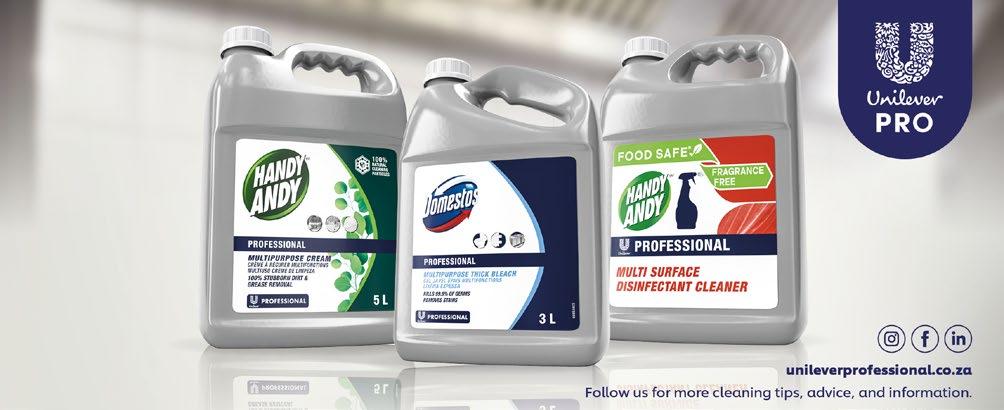
As flu season approaches, elevate your establishment’s cleanliness and safety with Unilever Professional’s effective cleaning tips. Incorporate our professional-grade solutions into your routine to enhance hygiene standards and maintain a germfree environment, ensuring both staff and visitors are protected.
Tip 1: Keep Surfaces Clean and Germ-Free During Peak Periods Hygienic surfaces are the foundation of a clean and safe business environment. Regular cleaning and disinfection of high-contact areas is crucial to minimise germ transmission during busy times. Here are the 3 key areas that need extra attention during peak periods:
Entrance and Reception Areas: These are visitors’ first contact points and can accumulate germs quickly. Regularly disinfect door handles, reception desks, and waiting area furniture.
Domestos Multipurpose Thick Bleach kills 99.9% of germs and is safe for most surfaces, offering long-lasting protection and stain removal.
Restrooms: High usage increases the risk of germ transmission. Focus on frequently cleaning taps, toilet handles, stall locks and replenishing soap dispensers and hand sanitisers.
Handy Andy Multipurpose Cream is ideal for daily cleaning tasks and bathroom use. It’s micro-particles ensure thorough cleaning for bathrooms and floors, while leaving surfaces shiny and protected.
Kitchen and Break Areas: Places where food is made and consumed are critical spots that require vigilant cleaning. Wipe down counters, tables, and food prep surfaces before and after each use to prevent the spread of germs.
Handy Andy Professional Multi Surface Disinfectant is part of our Food Safe* range, certified by the NCRS to eliminate 99.9% of germs without bleach. It’s formulated with a 100% naturally derived cleaning agent for frequent use in food preparation areas, ensuring a safe and hygienic environment.
To ensure protection from germs, use slower periods for deep cleaning to tackle the grime and build-up that regular cleaning might miss. Unilever Professional’s products are designed to penetrate deeply, ensuring your establishment upholds a consistently high standard of hygiene. Here are three areas to focus on for deep cleaning:
Kitchen and Food Preparation Areas: Deep clean all cooking surfaces, appliances, and utensils that come into contact with food. Ensure thorough cleaning behind and underneath equipment where grease and debris can accumulate.
Ventilation Systems: Clean and change filters in your HVAC system to ensure efficient operation and improve air quality. Ducts and vents should also be cleared of dust and potential mould build-ups.
Storage Rooms and Back Offices: These less-frequented areas can collect dust and clutter, contributing to poor air quality and potential pest infestations. Organise and clean all storage spaces, shelving, and desks.
When it comes to effective daily and deep cleaning, quality and efficacy should be prioritised over cost. Unilever Professional offers trusted, high-quality brands that enhance efficiency, reduce cleaning time, and save money. Buy in bulk for commercial use to ensure you have enough supply. Opt for the highest-quality products to maintain a hygienic business environment.
Unilever Professional’s cleaning solutions do more than just clean – they are essential to ensuring your establishment stays hygienically safe during flu season. By opting for our trusted, highquality range, you align with a partner committed to helping you achieve and maintain the highest standards of cleanliness and hygiene.
*Food Safe indicates that the product is safe to use on food preparation areas if usage instructions on back of pack are followed. This is supported by the certification provided by Intertek, an external company that performed the analysis on Toxicological Safety for Use in Direct Contact Applications (SANS 1828).
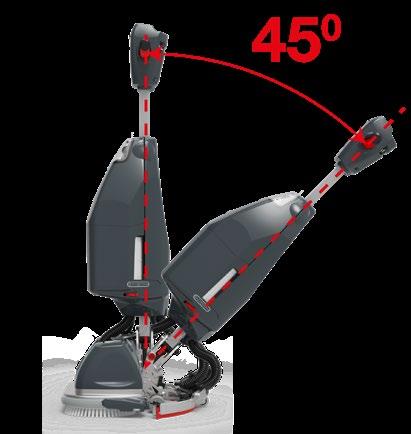
In the ever-evolving landscape of floor maintenance, the NX244 compact scrubber dryer emerges as a true game-changer. Its innovative design, coupled with unmatched efficiency and user-friendly operation, heralds a new era in cleaning technology, offering businesses a transformative solution to their floorcare challenges.
At the core of its appeal lies its ground-breaking design, tailored for agility and precision. Unlike traditional mopping techniques that often leave floors damp and inconsistently cleaned, the NX244 ensures surfaces are left clean, dry, and immediately safe for foot traffic. Its compact and agile build makes it an ideal choice for navigating small and congested areas, setting a new standard in floorcare excellence.
Efficiency reigns supreme with the NX244, boasting a remarkable 70 percent reduction in cleaning costs and an 80 percent decrease in water usage compared to conventional methods. Its direct feed to the centre of the brushes optimises the utilisation of clean water, minimising waste while enhancing the cleaning process, ensuring impeccable results every time. User-friendliness is paramount, as evidenced by its intuitive design and ease of operation. With features such as a footoperated floor tool and simple dashboard controls, the NX244 eliminates the need for frequent bending and ensures consistent performance regardless of user experience level.
Powered by the advanced NX300 lithium battery pack, the NX244 offers up to 80 minutes of uninterrupted runtime with fast charge
capabilities, enhancing productivity and prolonging the machine’s lifespan with up to 2,500 charge cycles.
Versatility is key, with a range of accessories available to tackle diverse cleaning challenges with precision and finesse. Coupled with comprehensive support via the Nu-Assist App, users have access to on-board “How to” videos, ensuring optimal performance at all times.
The NX244’s environmental impact is profound, with the potential to save over 5,000 litres of water annually when used just once daily, making it a cost-effective and environmentally friendly choice.
The NX244 compact scrubber dryer represents a monumental leap forward in floor cleaning technology. Its unparalleled blend of efficiency, user-friendliness and environmental benefits make it an indispensable asset for businesses seeking to elevate their cleaning operations while reducing their ecological footprint.
The NX244 offers a modern, productive, and sustainable alternative that is well worth the investment.


In a recent GBAC-TIPS peer-reviewed article, Do All Manual Floor Mopping Methods Give the Same Hygiene Outcomes?, the authors set out to determine whether different combinations of mop type and product used produced different hygiene outcomes on floors inoculated with Staphylococcus aureus bacteria.
Proper hygiene practices are essential to help mitigate contamination in commercial facilities, especially in healthcare. While conclusive evidence of the role of floors in the chain of infection is lacking to date, supporting evidence for the role of floors in pathogen dissemination has been steadily growing. This study investigated whether there were different hygiene outcomes associated with different manual floor mopping applications, varying the type of floor mop and the type of product used to mop the floor. It was hypothesised that the bactericidal efficacies of different hygiene products would be significantly different, and the hygiene practices used would cause variable levels of cross-contamination.
In the study, a two square meter floor that had been previously disinfected was inoculated with Staphylococcus aureus near one edge of the floor. Then the floor was mopped using combinations of launderable flat mops, disposable flat mops, and string mops combined with a neutral cleaner, hydrogen peroxide disinfectants, sanitizers, or quaternary ammonium chloride disinfectants. The inoculation zone was then sampled to determine how much of the bacteria was removed
by mopping. Then samples were taken every 0.5 square meters across the floor to determine how much bacteria was cross-contaminated across the floor.
There were statistically significant differences among product types used, with the neutral cleaner having the most average log10 densities recovered
remove the bacteria and provide a similar hygiene outcome to the use of biocidal products. This was not supported in the study. The neutral cleaner had the least efficacy against Staphylococcus aureus compared to disinfectants and sanitisers.
The mop type and product
Healthcare and other high-risk facilities should use biocidal products when manually mopping floors in clinical and other high-risk areas. Non-healthcare facilities should similarly use biocidal products in higher-risk environments to achieve the best hygiene outcomes.
(i.e., the most contaminated after mopping), compared to hydrogen peroxide or quaternary ammonium compounds-based disinfectant products. More cross-contamination was observed when cotton mops were used, while the area cleaned or disinfected had no significant differences among average log10 densities recovered.
While the neutral cleaner was not expected to be biocidal, the prevailing theory on the use of neutral cleaner when mopping is that the mechanical action of mopping would physically
combinations were significantly different; hence the overall performance of hygiene practices is highly dependent on product and mop type.
This suggests that healthcare and other high-risk facilities should use biocidal products when manually mopping floors in clinical and other high-risk areas. Non-healthcare facilities should similarly use biocidal products in higher-risk environments to achieve the best hygiene outcomes.
Read the entire peer-reviewed article at: issa.com/mopping-methods

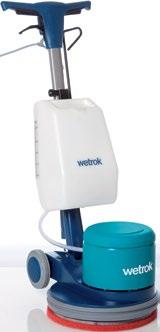












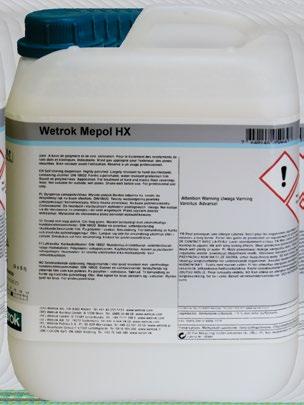

Think of the last time you walked into a small public space – a bathroom, convenience store, small retail shop or quick-serve restaurant. Was it clean? If not, what impression did the unclean space make? Likely poor.
Consequentially, you may have decided not to stay, shop or eat there. Now, think about your own business –whether it’s an entirely small space or a mixture of large and tight spaces. What kind of impression do you want to make on your customers? Can you afford reputational damage with consumers or losing employees that don’t want to work in unclean, unsafe conditions?
According to a recent Service Channel update, more than 70 percent of shoppers reported a negative in-store experience, including dirty washrooms, over a six-month span. That’s especially problematic since the report findings revealed that 85 percent of consumers still make more than half of their purchases at physical stores.
Furthermore, 64 percent of consumers surveyed for the report said they have walked out of a store because of the physical appearance or disorganisation – with 20 percent citing spilled products or messy floors. Can you afford to lose 20 percent of your business due to messy, dirty floors?
The good news is you don’t have to lose business or suffer reputational damage due to unclean conditions. Sure, smaller spaces are tighter and tougher to clean. But there are technological advances and proven tools available that make convenience store cleaning and retail floor cleaning quicker, more efficient, and more costeffective than ever.
Mop and bucket: why it falls short as a solution
The traditional mop-and-bucket
approach to cleaning floors in small spaces has gone the way of the dinosaur – or at least it should. Cleaning with a string mop and bucket is counterproductive to keeping the floors in small spaces clean. This method just pushes dirt around rather than lifting it – leaving surface soil on a so-called clean floor.
With a traditional string mop, mildew can build on the mop, which results in spreading bacteria on floors. Likewise, too much cleaning solution on the mop can leave streaks on floors. In terms of maintenance, mop heads need to be washed after each use to minimise spreading dirt around. In addition, the cleaning solution in buckets needs to be changed often to prevent mopping with contaminated solution.
Microfiber flat mop systems and corded or battery-operated micro scrubbers are a step up from traditional string mops and buckets. Microfiber mops are easy to use, but the pads must be replaced frequently to prevent the spread of grime. Depending on how frequently small spaces need to be cleaned, this could add time to the task of floor cleaning.
Micro scrubbers are another far superior alternative to cleaning floors with string mops and buckets. They come with a variety of options and at various price points. Micro scrubbers like the Tennant CS5 eliminate many of the challenges
ergonomic handle. It’s ideal for hard-toreach spaces in retail and convenience stores; with up to 70 minutes of runtime and a reduced noise level with Eco Mode setting.
Micro scrubbers have a higher up-front cost. But when factoring in productivity, sales impacts, and slip/fall risks,
It’s time to act – now that you know the business risk of not maintaining clean floors in small commercial spaces. The old mop-and-bucket approach to cleaning these spaces isn’t effective or efficient. There are a variety of options that are far superior to string mops and buckets, including micro scrubbers and modern mechanised mops. Level up your cleaning routine in small spaces to make a positive, lasting impression on your customers and staff.
of traditional mop and bucket cleaning. Its separate solution and recovery tanks deliver fresh water for scrubbing. Easy to operate under and around obstacles to clean hard-to-reach areas with the movable handle and compact size; add to that the ability of 50–75 minutes of run-time, depending on battery type.
The Tennant CS16 walk-behind floor micro scrubber is compact, reliable, and user-friendly machine that suits cleaning in tight spaces with easy-touse controls, low-profile design, and

automated floor cleaning equipment provides a lot of value over time.
The latest breakthrough for cleaning small commercial spaces is Tennant’s i-mop® Lite. This smaller, mechanised scrubber was specifically designed to clean small commercial spaces. It makes cleaning bathrooms, kitchens, entrances and other tight areas far easier, and more effective and efficient than other alternatives.
The i-mop Lite cleans in tight spaces and around obstacles, which is ideal for retail floor cleaning and cleaning floors in any small public space. It’s lightweight, easily manoeuvrable, and capable of 360° movement. In addition, the i-mop Lite has a minimal footprint and can be easily picked up, carried, stored and used.
There are no electrical cords with the i-mop Lite mechanised scrubber. It’s powered by environmentally friendly Lithium-ion batteries that can clean 1,402.5m2 (15,069 ft2) hourly with a run time of 45 minutes per charge. This commercial floor cleaning machine comes with a rechargeable modular battery pack, and additional battery packs can be ordered for continuous run time by swapping out and recharging with an extra set of batteries.
A detachable tank makes it easy to replace or change cleaning solutions quickly or empty recovery water in a sink with minimal downtime. It also has a powerful 500 RPM motor that operates at twice the speed of many conventional disk scrubbers.
Make small spaces shine
It’s time to act – now that you know the business risk of not maintaining clean floors in small commercial spaces.
The i-mop Lite cleans in tight spaces and around obstacles, which is ideal for retail floor cleaning and cleaning floors in any small public space. It’s lightweight, easily manoeuvrable, and capable of 360° movement.

The old mop-and-bucket approach to cleaning these spaces isn’t effective or efficient.
There are a variety of options that are far superior to string mops and buckets, including micro scrubbers and modern mechanised mops. Level up your cleaning routine in small spaces to make a positive, lasting impression on your customers and staff.
Learn more about Tennant solutions for commercial floor cleaning in small spaces by visiting: www.goscorcleaning.co.za
Focus Facilities Solutions, offers a comprehensive analysis of the challenges faced by small businesses in South Africa’s facilities management sector, highlighting resource limitations, competitive pricing, and meeting high client expectations. Small businesses in the facilities management sector in South Africa face a unique array of challenges that can hinder growth and success.
From resource limitations to client acquisition and sustainability, navigating these obstacles requires strategic planning and innovative solutions.


Navigating these hurdles, from competitive pricing to regulatory compliance and risk management, is essential for sustainable business growth and client satisfaction. One of the primary challenges for small facilities management businesses is resource limitations. This includes financial constraints, limited manpower, and restricted access to advanced technology and tools.
However, rather than seeing these limitations as roadblocks, small businesses can turn them into opportunities for innovation and efficiency.
Competitive pricing remains a significant challenge, particularly for smaller companies competing against industry giants. These larger firms often have cost advantages that make it challenging for smaller
businesses to match their pricing models. Additionally, meeting high client expectations for quick project turnaround times can strain resources and impact operational efficiency.
During May 2020, amid the countrywide COVID-19 pandemic, our company was thrown into the deep end when tasked with the deep cleaning of 137 SA Post Offices in the Western and Northern Cape. Despite the immense challenge, it was by far, one of the best and largest projects we have completed to date. Fortunately, we were well prepared for the task and created an additional 421 jobs during a very difficult economic time.
The cash outlay issue, where facilities management businesses must pay service providers upfront but only receive payment from clients after completing the job, further complicates financial management.
Meeting the stringent criteria of high-end clients adds another layer of complexity to service delivery.
The Newlands Cricket Stadium in Cape Town has been one of our most prestigious clients for well over a decade, and we have been extremely fortunate to have been their chosen service provider for managing the cleaning of the stadium before, during and after the annual seasonal games. Naturally, the stadium hosting international games always demands the highest quality standard from its
service providers and we are proud to have met their exacting standards.
Implementing a three-quote comparative system can help small businesses negotiate competitive pricing with service providers. The three-quote system is essentially a structured way of shopping around for what you need from suppliers, similar to how a price comparison site might operate. Engaging with different suppliers is beneficial in procurement for numerous reasons. The most obvious is cost-effectiveness, but getting to know different suppliers also means accessing quality goods and building long-term relationships that may lead to further partnerships in the future.
Building strong relationships with suppliers based on transparency and open communication about project budgets can lead to mutually beneficial arrangements. Based on the quotes you have gathered and what you need, you decide which supplier is the best match and is still within your budget. It is like when choosing the best tool for the job, you should evaluate each one based on your needs.
Working within one’s means, such as optimising office space and avoiding overcharging clients based on their international status, can also contribute to cost-effective solutions.
Understanding the industry and client needs is crucial. Researching the sector thoroughly and staying informed about trends and best practices can help businesses offer tailored solutions.
Flexibility is key, as different clients may have unique requirements. Having contingency plans and providing clients with multiple options demonstrates adaptability and responsiveness.
Being specialists in deep cleaning, we thoroughly enjoy a challenge, doing the impossible and challenging ourselves in our turnaround time to complete dead-lined projects. In December 2020, we were part of an SME programme where we were allowed to showcase what we do to G4S Head Offices in Centurion. We cleaned over 4,000m2 of carpeted floor area and over 200 office and boardroom chairs in their building over a weekend with three nightshifts to accommodate the client during a crucial period. Our client was more than pleased with the work conducted by our team and could immediately see the difference.
Sustainability has always been and is becoming even more vital in facilities management. Adapting to global trends such as climate change and technological advancements like AI requires integrating sustainable
practices into service offerings. This includes staying updated with market trends, exploring new business avenues aligned with sustainability goals, and avoiding over-reliance on a single strategy or client. A company needs to implement sustainable solutions from the start to be as ecofriendly as possible.
Some important contributing factors to becoming a truly viable entity.
Energy resources: Energy resources and efficiency are two of the biggest proponents of sustainability. With ecofriendly power, facilities management services cut costs while helping the environment and contributing to their social responsibility.
Facility maintenance: Small businesses in the facilities management sector often overlook essential maintenance tasks like monthly inspections, inventory checks, and client follow-ups. These tasks are crucial for maintaining client satisfaction, proactively addressing issues, and ensuring operational efficiency. Regular feedback and reporting foster accountability and continuous improvement.
Technology: Technology plays a vital role in enhancing efficiency and effectiveness. Communication tools, project management apps, and
remote monitoring systems streamline operations, reduce costs, and improve decision-making processes. Embracing tech solutions minimises travel time and expenses associated with client interactions.
Research: Small businesses must conduct thorough research on industry regulations and standards. Creating a checklist and addressing each requirement systematically ensures compliance. Regular monitoring and updates help businesses stay abreast of evolving regulatory frameworks and maintain a compliant business environment.
Risk management: Managing risks such as safety hazards and equipment failures requires proactive measures. These include prioritising safety protocols, investing in quality equipment and maintenance, and providing adequate training to employees. Contingency planning, insurance coverage, and regular risk assessments further mitigate potential threats.
Focus Facilities Solutions is a dynamic and innovative company dedicated to excellence in corporate and construction cleaning services, with a commitment to delivering comprehensive facilities solutions. For more information visit: www.focusfs.co.za


Automation is advancing apace in the textile-care sector.
RFID systems, robotics and artificial intelligence are introducing greater transparency into the flow of goods, carrying out high-risk, heavy or monotonous work and improving quality control processes. The degree of automation in the textile-care sector has already reached a high level and, in many cases, everything operates smoothly, just like a production line. Nevertheless, more tasks that are still carried out manually could be taken over by machines and robots in the future. The latest innovations in the field of automation will be on show at Texcare International in Frankfurt am Main from 6 to 9 November 2024.
Laundry traceability
Although there are alternatives, RFID technology is an important tool for textile-care companies when it comes to laundry management. Tags, i.e., transponders or chips embedded in textiles, contain all relevant information about each individual item. These tags are identified by readers, i.e., detection devices, and ‘translated’ into the next processing stage via interfaces, thus eliminating the need to manually read in a barcode. Bulk goods can in turn be localised using UHF technology, which leads to more operational transparency. Wireless systems are, therefore, set to become increasingly important for
machine-supported, efficient laundry processing, as shown by a variety of automation developments.
Automatic soiled laundry inspection and sorting
In future, sorting dirty laundry could be one of the processes that can be carried out by machines. In the systems developed by Denmark’s Inwatec company, intelligent technology separates, recognises and classifies the goods delivered: robots pick up the individual items of laundry from conveyor belts, while RFID chip readers or cameras and artificial intelligence identify and register each item, be it workwear, towels or even bed linen. Immediately afterwards, an X-ray scanner automatically detects unwanted, hidden items in the bags and removes these articles. Only approved laundry items are forwarded and sorted by the system in accordance with the designated washing or cleaning process. The system, which can operate around the clock, is reliable and fast. In hospital laundries, it also minimises contact with harmful germs and the risk of injury from sharp or pointed objects. Nevertheless, such a system still cannot work fully automatically because, on the one hand, the incoming laundry has to be loaded manually from the trolleys into the sorting system and, on the other hand, the employees must handle the rejected garments, identify valuable

items and return them to the wearers if the labelling makes this possible.
Scanners monitor the quality of flat linen
The handling of dry laundry is also characterised by fewer personnel and more automated technology. Thanks to developments by several companies, the continuous scanning of textiles for holes, stains, deformations or colours has long been used for ironing laundry of identical dimensions. At this point, imperfect items are removed from the process, after which the flawless items are automatically folded and stacked.
Robots do the folding without taking a break
Other automated processes now include the folding and stacking of terrycloth products. Companies

such as Hebetec Wäschereitechnik, Kannegiesser and Sewts are set to present corresponding solutions at Texcare 2024. Andreas Langer, Kannegiesser’s Marketing Manager, explains the reasons behind the development of the fully automated dry laundry line, “due to fatigue, the operator’s input performance naturally fluctuates and decreases over the course of a shift. Automation prevents input from becoming a bottleneck and slowing down the laundry process. This arduous task is performed by stateof-the-art equipment. Working with advanced technology, such as robots and intelligent control systems, has another advantage: it makes it easier for a modern laundry to attract tech-savvy employees and specialists who find working with innovative and futureoriented technologies exciting and want to be part of a modern company.”
The principle of a fully automatic terrycloth folding system is usually based on modern image recognition systems and sensors. These enable one or more robot arms to recognise, grip, align, identify or measure an item in a laundry trolley, feed it to the folding machine, fold it with the appropriate folding programme and then stack it. Depending on the manufacturer, these processes are carried out in accordance with specific procedures, which also influence the performance of the machine. According to Kannegiesser, this results in an hourly folding rate between 600 and 700 items, depending on the variety of items to be processed. For example, a person is still faster than a machine when folding smaller items of laundry, such as flannels.
To date, processing automation has usually concluded with the laundry items grouped together in stacks, which are then manually sorted, picked, assigned to tours or stored. This gap between the folding machine and the packaging area can now also be closed, too, thanks to a storage and replenishing system for stacked flat linen developed by the Jensen Group. The stacks of clean laundry are placed on a storage belt and automatically fed to the staff who fulfil the orders. An additional storage system that can also be integrated into the system provides further space for the laundry stacks. They are temporarily stored there, retrieved as required and transported to the packing station using cranes and conveyor belts, where laundry staff complete the deliveries for the customers.
“As a transport system for stacked flat laundry, our system fulfils all requirements for maintaining the quality, cleanliness and hygiene of the finished goods right through to the dispatch area. The individual stacks are transported separately, which prevents unintentional displacement of the linen and manual repositioning. Thus, automated processing from the storage conveyor ensures a consistent level of quality, which enables user-friendly packaging and leads to customeroriented delivery of laundry stacks. Simultaneously, this cuts down on the number of employees required in the final stage of a textile hire company, which can ease the pressure on the usually tight staffing levels in the companies,” explains Jensen Group Marketing Manager, Nicolas Gostony.
Human skills remain in demand
Thanks to the rapid development of sensors, artificial intelligence and robotics, textile care 4.0 is taking on even more tangible forms. These clever systems give companies the chance to automate similar tasks and thereby improve their performance, laundry quality and hygiene. Shortages of skilled and unskilled labour can be better covered, while employees benefit from a higher quality of work and new opportunities for development. Nevertheless, despite the rapid advances in automation, the textile service industry is inconceivable without human beings. Their cognitive skills are required, in particular, for coding, individualisation (applying name badges or patches), length adjustment and repair, as well as for cleaning private laundry. In many cases, a trained eye is often faster than cameras and artificial intelligence when it comes to quality control and assessment. However, as such activities quickly lead to fatigue, it is likely that the next wave of automation will be in this area of textile care.

Texcare International in Frankfurt am Main offers a comprehensive overview of innovations from all product parts of the textile-care sector. More than 300 exhibitors from all over Europe, Asia and North America will be showcasing their innovations from recent years. In addition to the major manufacturers of machines, chemicals and textiles, new companies from the fields of robotics and IT will also be making presentations.
Further more information visit: www.texcare.com
The BEECA Cleaning Association held their first golf day during April at the Copperleaf Golf Club. Also known as The Els Club at Copperleaf, this is a ‘signature’ Ernie Els designed golf course with a country atmosphere and the Magaliesberg as a backdrop. Situated just 15 minutes outside Centurion CBD, Copperleaf is best defined as a ‘modern classic’; the layout tests every aspect of the game and provides the longest hitters with a challenge. It turned out to be a perfect autumn day, with the event and prize-giving ceremony meticulously organised by the association that shared plans to turn this BEECA Golf Day into an annual event. The evening proceedings commenced with a welcome and introduction by the BEECA board Chairperson, Mmabatho Skosana. The evening keynote address was delivered by BEECA Co-founder, Trevor Ackerman and the association also used the Golf Day Dinner as an opportunity to launch its new corporate video.
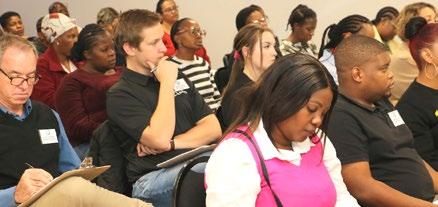
South Africa’s National Contract Cleaners Association (NCCA) organised a free to attend seminar titled ‘How to Accurately Quote Cleaning Contracts’ for members on 19 April 2024. The seminar, held at the NCCA’s training centre in Johannesburg, attracted a cross section of cleaning
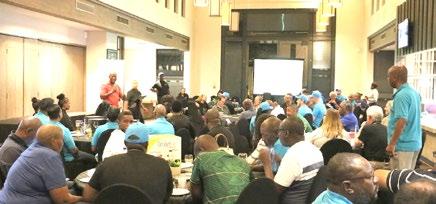
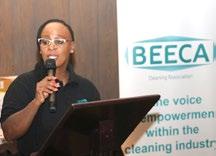
industry representatives keen to learn more about cleaning labour cost analysis, site evaluation, customer expectations and determining the scope of work to mention a few. The seminar was sponsored by CSG Skills and presented by MS Consultancy’s Marietjie Swanepoel. The seminar emphasised the multifaceted nature of accurate quoting. Beyond mere calculations, attendees gained insights of cost analysis, pricing strategies, and profitability optimisation. Armed


with the newfound knowledge and quoting techniques, attendees expressed confidence in their ability to navigate the competitive contract cleaning landscape. “With demand exceeding capacity, the NCCA plans future training sessions. The anticipation is palatable as cleaning industry professionals eagerly await an opportunity to further hone their skills and elevate their business to new heights,” said Swanepoel.
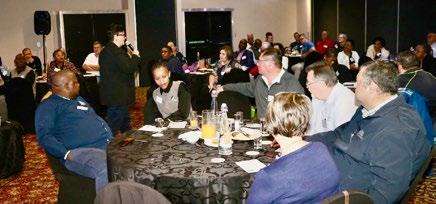


The Professional Body for Environmental Hygiene (PBEH) held it first business breakfast for the year during April at the Protea
Hotel in Midrand. The keynote address was presented by Dr Linda Meyer, an accomplished C-suite executive with a track record of accomplishment in the private and public sectors. She has extensive experience in Higher Education leadership, governance, enterprise risk management, public policy, and performance evaluation frameworks and has successfully executed domestic, regional, and international projects, offering decisive leadership combined with sharp business insights, while maintaining high accountability. Furthermore, Dr Meyer has a deep understanding of public policy, governmental and regulatory engagement, project administration, financial management, internal controls, and how to foster
effective communication and stakeholder relationships.
Her address titled “Career Pathways in the Cleaning Industry” addressed South Africa’s biggest economic challenge, namely record levels of unemployment, drawing a direct link between the level of education and the probability of being unemployed, from below grade 12 to graduate levels. Her address elaborated on the issue of collaboration between SETAs and Professional Bodies where the latter is recognised for its comprehensive industry knowledge and subject matter expertise. Don’t miss the next PBEH business breakfast planned for 20 June 2024 at Kelvin Grove, Newlands in the Western Cape.
For more information contact: admin@pbeh.co.za
New from Essity are Tork Xpress ® Multifold hand towel bundles that have been compressed by 50 percent compared with standard folded Tork towels. Essity uses compression technology to halve the amount of air in these bundles. This means the dispenser caters for double the number of customers and accommodates twice as many towels before requiring a refill.
“We are continually innovating to help businesses gain more from their existing resources and benefit from sustainable hygiene. Our compressed towels increase efficiency because they require fewer refills and help to ensure that towels are always available to support hygiene routines,” said Tork Hand Wiping Product Director, David Chalmers.
The new compressed towels also make life easier for cleaners

Bbecause twice as many will fit onto a cleaning trolley. This saves time when transporting and refilling dispensers. The towels also offer sustainability benefits because they require up to 27 percent less packaging material than standard Tork folded towels. They also reduce CO2 emissions from transport because double the number will fit onto the same truck.
Additionally, they allow businesses to optimise their storage capacity since twice as many towels may be stored in the same space as non-compressed alternatives. New compressed bundles of Tork Xpress Multifold towels are particularly suitable for use in hotels, restaurants, cafés, offices, and smaller healthcare settings such as clinics and GP surgeries. Tork hygiene products and services aim to meet the needs of all businesses, particularly those

with smaller facilities and without dedicated on-site facility managers.
For more information about compressed towels or the Tork Xpress Multifold hand towel system, visit: www.tork.co.uk/ XpressCompressed
This is a no-touch hand hygiene dispensing system that brings back into use the traditional bar of soap in an innovative and smart new way. Employing a grinder to dispense granules onto the hands, each small bar offers up to 300 washes. There is no waste and the non-fatty-acid soap leaves no residue. The solid handwash refill reduces the CO2 footprint with no transportation of excess water and less packaging than any liquid handwash refill. It requires zero plastic packaging, thereby eliminating hard to recycle handwash packaging from washroom operations. The system also benefits from zero product waste, in fact 100 percent of the solid handwash refill is used compared to closed liquid handwash dispensers where up to 25 percent of the product can remain unused on disposal. It is energy efficient and features a rechargeable battery. Diversey – A Solenis Company won the prestigious Amsterdam Innovation Award for its LESSEAU® NO-Touch bar soap dispenser and refills.
audoin Wash Systems developed its Wash Drone using the latest smart technology for use on difficult to access buildings – buildings that are often almost impossible to clean, require specialist and expensive access equipment, or demand that personnel work at height. It is a high pressure cleaner, using pure water technology and is easily controlled from the ground. The Baudion wash drone scooped both the Amsterdam Innovation category and visitors’ choice awards at this year’s Interclean Amsterdam show.

